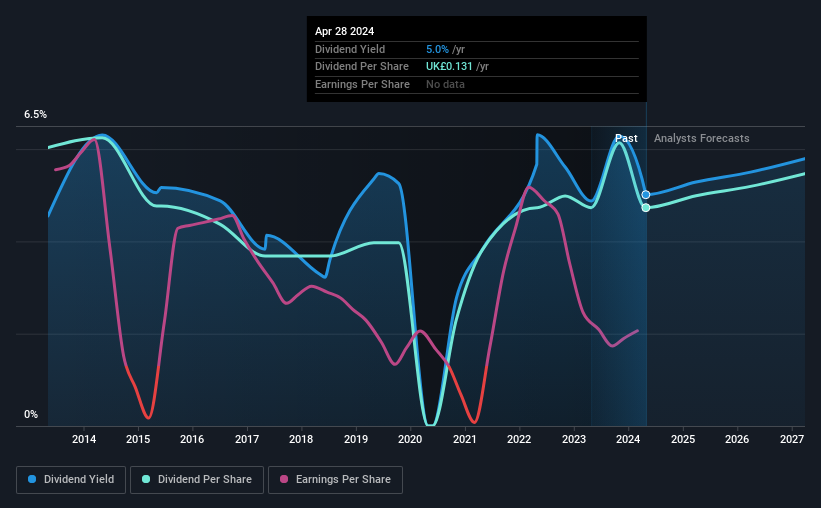- United Kingdom
- /
- Food and Staples Retail
- /
- LSE:SBRY
J Sainsbury (LON:SBRY) Is Due To Pay A Dividend Of £0.092

The board of J Sainsbury plc (LON:SBRY) has announced that it will pay a dividend of £0.092 per share on the 12th of July. The dividend yield will be 5.0% based on this payment which is still above the industry average.
Check out our latest analysis for J Sainsbury
J Sainsbury's Dividend Is Well Covered By Earnings
If the payments aren't sustainable, a high yield for a few years won't matter that much. Prior to this announcement, the company was paying out 223% of what it was earning, however the dividend was quite comfortably covered by free cash flows at a cash payout ratio of only 75%. Generally, we think cash is more important than accounting measures of profit, so with the cash flows easily covering the dividend, we don't think there is much reason to worry.
Looking forward, earnings per share is forecast to rise exponentially over the next year. If recent patterns in the dividend continue, we could see the payout ratio reaching 51% which is fairly sustainable.

Dividend Volatility
The company has a long dividend track record, but it doesn't look great with cuts in the past. Since 2014, the dividend has gone from £0.167 total annually to £0.131. Doing the maths, this is a decline of about 2.4% per year. Generally, we don't like to see a dividend that has been declining over time as this can degrade shareholders' returns and indicate that the company may be running into problems.
Dividend Growth Is Doubtful
Given that the dividend has been cut in the past, we need to check if earnings are growing and if that might lead to stronger dividends in the future. Over the past five years, it looks as though J Sainsbury's EPS has declined at around 5.2% a year. Declining earnings will inevitably lead to the company paying a lower dividend in line with lower profits. It's not all bad news though, as the earnings are predicted to rise over the next 12 months - we would just be a bit cautious until this can turn into a longer term trend.
The Dividend Could Prove To Be Unreliable
In summary, while it's good to see that the dividend hasn't been cut, we are a bit cautious about J Sainsbury's payments, as there could be some issues with sustaining them into the future. The payments haven't been particularly stable and we don't see huge growth potential, but with the dividend well covered by cash flows it could prove to be reliable over the short term. We don't think J Sainsbury is a great stock to add to your portfolio if income is your focus.
Investors generally tend to favour companies with a consistent, stable dividend policy as opposed to those operating an irregular one. Meanwhile, despite the importance of dividend payments, they are not the only factors our readers should know when assessing a company. For example, we've picked out 3 warning signs for J Sainsbury that investors should know about before committing capital to this stock. Looking for more high-yielding dividend ideas? Try our collection of strong dividend payers.
New: Manage All Your Stock Portfolios in One Place
We've created the ultimate portfolio companion for stock investors, and it's free.
• Connect an unlimited number of Portfolios and see your total in one currency
• Be alerted to new Warning Signs or Risks via email or mobile
• Track the Fair Value of your stocks
Have feedback on this article? Concerned about the content? Get in touch with us directly. Alternatively, email editorial-team (at) simplywallst.com.
This article by Simply Wall St is general in nature. We provide commentary based on historical data and analyst forecasts only using an unbiased methodology and our articles are not intended to be financial advice. It does not constitute a recommendation to buy or sell any stock, and does not take account of your objectives, or your financial situation. We aim to bring you long-term focused analysis driven by fundamental data. Note that our analysis may not factor in the latest price-sensitive company announcements or qualitative material. Simply Wall St has no position in any stocks mentioned.
About LSE:SBRY
J Sainsbury
Engages in the food, general merchandise and clothing retailing, and financial services activities in the United Kingdom and the Republic of Ireland.
Excellent balance sheet with proven track record.


